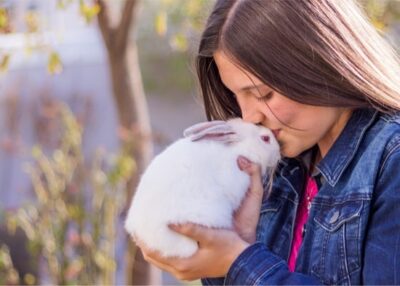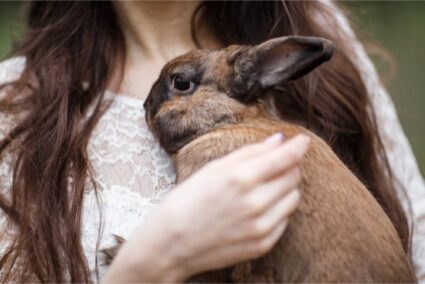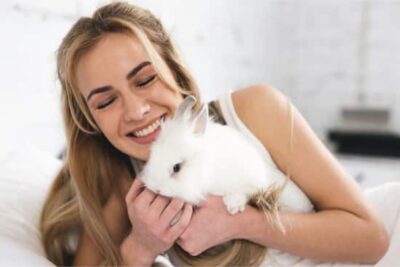Rabbits are among the most popular domesticated small animals in the United States. This suggests that owners of rabbits can forge an emotional bond with their pets. Like all mammals, rabbits experience of a range of emotions, both basic and complex.
A domesticated pet rabbit will understand and mirror the emotions of their owner. If you’re happy, you’ll find your rabbit reflecting this joy. If you are withdrawn and depressed, a rabbit will express concern for your predicament.
Owning a rabbit comes with responsibility. Never assume that a rabbit is perfectly fine in a hutch with hay to chew. Rabbits have complex emotional needs that must be respected and met. In turn, you’ll need to manage your own emotions around rabbits, lest they imitate them.
Can Rabbits Understand Humans?
As mammals, rabbits share an emotional bond with humans. The brains and emotional states of the two species are not identical. There are enough similarities to find common ground.
A prominent example of shared emotion between rabbits and humans is grief. When an owner loses a beloved pet, it’s no different from losing a family member. A mourning process must be respected and observed.
The same goes for two bonded bunnies. When two rabbits forge a connection with each other, it usually lasts a lifetime. This means that a rabbit will notice when their friend is missing. They’ll experience sadness as a result.

In such an instance, it’s pivotal that you manage your own emotions around rabbits. This mainly because you need to understand that fear is the primary emotion that governs bunnies.
Rabbits in the wild understand their place in the food chain. They know that larger animals are waiting to hunt them. As far as rabbits are concerned, humans are the scariest predators of all.
If you approach a rabbit with an open heart that’s filled with love, your rabbit will understand this. It will take time, but they’ll realize that you mean them no harm. A rewarding relationship based on mutual trust will be forged.
If you approach a rabbit while angry, upset or grieving, they’ll know this. This, in turn, will deter a bunny from having anything to do with you.
Rabbits do not understand many spoken words. You need to gain their trust in subtler ways. This means approaching with an open heart, and showing that they have nothing to fear. A rabbit will mirror any emotion that you put out.
Do Rabbits Understand Human Facial Expressions?
Rabbits have a wide range of facial expressions of their own. However, this does not mean that they understand the changes in a human face.
Despite this, some human facial expressions are unmistakable. If you approach a rabbit with your teeth bared, for example, they’ll be frightened. This is a universal sign of danger. Even if you’re smiling, your rabbit may misunderstand.
More often than not, a facial expression is less important than the emotional and intent behind it. Rabbits do not understand resting faces, and the complexity behind them.
If you approach a rabbit in a bad mood, they won’t respond to the scowl on your face. They will pick up on your general agitated energy. This will fill them with worry.
A sense of delight to see your pet will be unmistakable to a rabbit. They’ll detect that you’re here to make their lives better. If you have bonded with your rabbit, they’ll reciprocate that happiness.
Do Rabbits Understand Changes in a Human Tone of Voice?
As RabbitWise explains, rabbits will learn to respond to human words. Their names are a good example. Many rabbits will come when called, especially if they think it will be worth their while.
Like most animals, it’s not the word itself that your rabbit is responding to. It’s the tone of voice that you use, and the pattern of the sounds.
If you say, “yum yum!” in a singsong tone when feeding your rabbit, they’ll remember. They’ll associate the sound with pleasure, and respond accordingly. Bellow the same words in an angry tone and they’ll cower in fear. Rabbits also like listening to music.
The tone of voice that you use with your rabbits can be pivotal to their development and bonding. Build trust before you attempt to admonish your rabbit for undesirable behavior.
Naturally, you’ll have to install a firm understanding of a, “no” command in your bunny’s brain. Rabbits can and will get themselves into trouble chewing cables, and similar actions.
That isn’t saying that your rabbit will always respond how you want. They may understand what you’re saying, but choose to ignore you. A short, sharp noise will give them pause for thought.
As is fitting, rabbits respond better to the carrot than stick. Praise your rabbit, and ensure that they understand that you are happy when speaking. This will garner a better reaction than attempting to elicit a fear-based response.
Do Rabbits Understand Kisses?
Rabbits are adorable animals. This means that’s only natural that you may want to kiss your pet. You should approach this action with caution, however.
Rabbits are prey animals. A healthy fear of predators, and a related survival instinct, is hardwired into their bunny brains.
Unless you have a strong bond with your pet, they may see you as a threat. Think about it from your rabbit’s perspective. What they experience is a larger animal bringing their mouth toward them.
They could easily misconstrue this as an attempt at making a meal of them. You’ll learn in such an instance that rabbit bites can hurt.
If you do have a good relationship with your pet rabbit, they’ll learn to understand kisses. Petting on the head, for example, often elicits purring. As is so often the case, it’s the emotion behind the action that matters.
If you’re kissing your rabbit, it’s likely because you feel a surge of affection for them. Your pet will understand this, and react. Doing so reluctantly will just upset them.
With this in mind, never force somebody to kiss a rabbit if they’re reluctant. The rabbit will pick up on this hesitation, and react badly.
Do Rabbits Understand Hugs?
Hugging is a regular point of contention for pets. While a hug is a popular show of affection among humans, many animals dislike the sensation.
As BunnyHugga explains, you’ll need to forge a strong bond with your bunny before attempting a hug. Even then, there is no way of knowing how your rabbit will react.
The issue that rabbits have with hugs is that they feel trapped. Most animals are uncomfortable if they feel they cannot exit a situation quickly. Your rabbit may not understand that you are showing affection, and squirm and bite.
Before attempting a hug, strengthen your bond with your rabbit through stroking, grooming, and gentle handling. After a while, attempt a hug.
Some rabbits will respond positively, but others will freak out. It depends on the animal. Don’t take it personally if your pet panics. Hugging is not something that comes naturally to rabbits.
Can Rabbits Get Attached to Their Owners?
Rabbits most certainly become attached to their owners. However, the relationship is more akin to a cat than a dog. Rabbits do not offer unconditional love, and can be complex pets.
What’s important to know is that rabbits are social animals by their very nature. As the Indiana House Rabbit Society explains, bunnies that spend too much time alone become depressed.
If you’re considering a pet rabbit, ensure you have enough time to spend with them. You should also keep your rabbit indoors. This means they’ll always have somebody on hand to keep them company. Here’s some advice on moving an indoor rabbit outdoors.
Bonding with a rabbit is a similar experience to most pets. You need to fill their life with positive experiences. If your rabbit sees you as a source of pleasure, they’ll become attached to you.
Just remember that the reverse of this is also true. Rabbits are fearful creatures. If you give them any reason to distrust you, they’ll do just that. An ornery rabbit can be troublesome to handle, so manage your relationship carefully.
How Do Rabbits Demonstrate Affection for Their Owners?
We have established that rabbits feel love for their owners, but how do they show it? As discussed, rabbits have a different love language to humans.
Pet Helpful explains some of the ways that rabbits demonstrate their fondness for us. They include:
- Licking and nibbling. Being bitten may seem like an act of aggression. If it’s a gentle nip, however, your bunny is grooming you. That’s an honor!
- Nudging. Contented rabbits that enjoy their owners’ company love having their head scratched. If your rabbit demands this treatment, they love and trust you.
- Purring and clicking teeth. Rabbits are capable of purring when contented. They may also click and grind their teeth.
- Running and jumping. If your rabbit is excited to see you, they’ll let you know. This usually involves running around your feet in circles. They may also jump in the air and flick their ears. This is known as binkying.
- They are lying next to you. The ultimate sign of rabbit love is relaxing beside you on your bed or sofa. If your bunny rolls onto their back, they’re completely content and relaxed.
If your rabbit displays these behaviors, then congratulate yourself. You are maintaining a positive, happy and healthy relationship with your pet!
Can Rabbits Sense Illness in Humans?
Rabbits may not sense illness, per se, but they detect changes in our general emotional state. That has been the crux of this entire guide.
As a result of this, a rabbit will know when the owners are under the weather. If you have the flu, and are feeling sorry for yourself, your rabbit will notice.

Likewise, if you are worried about your health, this will be reflected in your emotions. Your rabbit will pick up on heightened stress, fear and anxiety, and mirror this.
You’ll likely notice that your rabbit will become more affectionate if you’re poorly. They will know that something is wrong, and want to cheer you up.
You’ll have to be careful with this, though. If you expose your bunny to too much negative emotion, they’ll absorb it.
Try to stay calm and act normal when you’re sick. If your rabbit has cause to worry, they will. This can be hazardous to their health.
Can Rabbits Sense Human Pregnancy?
Rabbits have an excellent sense of smell. Like most prey animals, they use this to survive in the wild. As a result, even domesticated bunnies can detect changes in human pheromones.
Few changes to the human body are more pronounced than pregnancy. This means that your rabbit will undoubtedly notice. How they react depends on their unique personality.
Many rabbits become clingier when their owners are pregnant. They will rarely want to leave their side. Popular opinion attributes this to a rabbit being protective. If you’ve bonded, the bunny considers you part of the family.
Some rabbits start acting out when their owners are pregnant. They may bite and nip their human. They may also take out their concerns on fellow rabbits. In such an instance, the rabbit is likely jealous and fearful.
Rabbits and humans are more alike than we may realize, especially when it comes to emotions. Never make the mistake of assuming that a bunny is a cold, impassive animal.
Learning your rabbit’s emotions, and how they express them, is key to a happy relationship. What’s arguably even more important is managing your own moods around your rabbit.
If you have a rabbit a reason to worry, they’ll embrace it. It’s the default state of an animal that is always surrounded by predators.
Keep the mood light, and surround your bunny with good vibes. If you can manage this, your pet will detect and mirror your contentedness.

